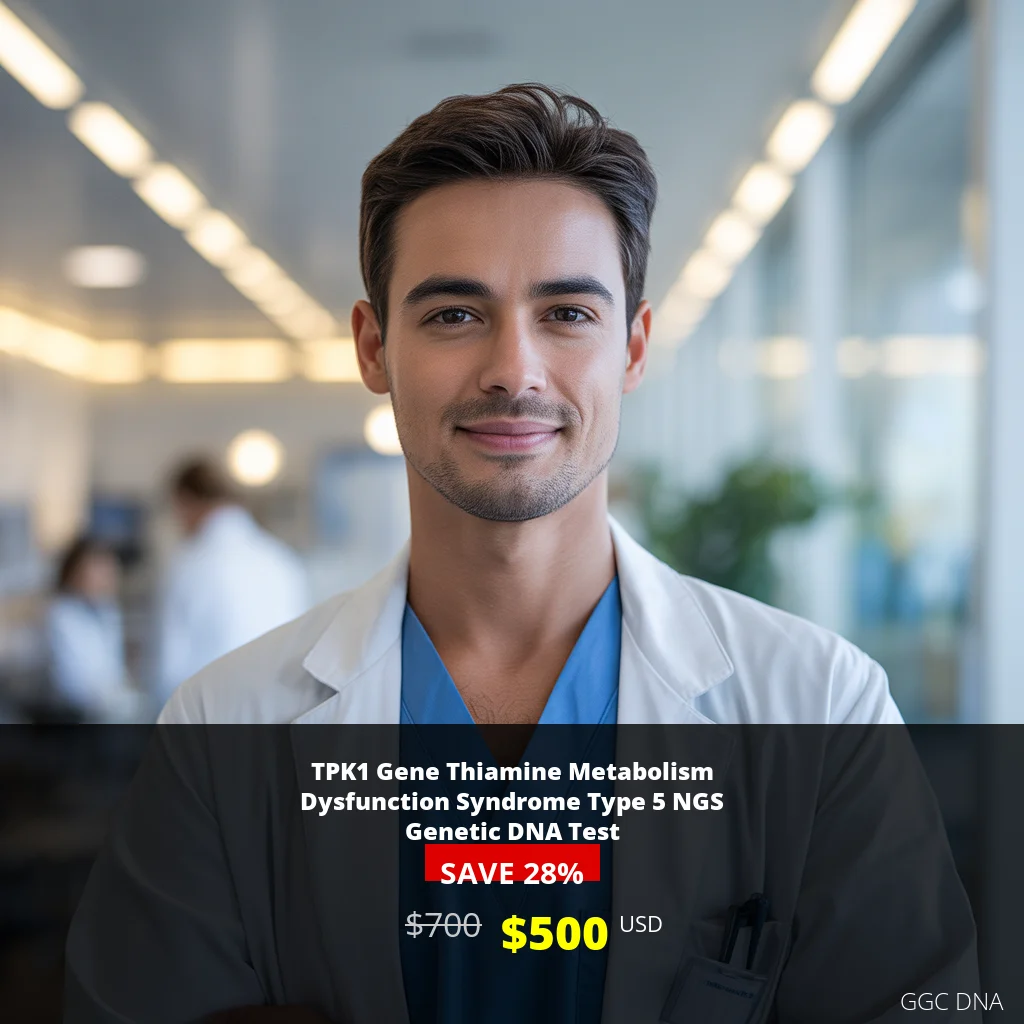TPK1 Gene Thiamine Metabolism Dysfunction Syndrome Type 5 NGS Genetic DNA Test
Comprehensive Genetic Screening for Metabolic Disorders
The TPK1 Gene Thiamine Metabolism Dysfunction Syndrome Type 5 NGS Genetic DNA Test represents a breakthrough in precision medicine for diagnosing rare metabolic conditions. This advanced genetic screening specifically targets mutations in the TPK1 gene, which plays a critical role in thiamine (vitamin B1) metabolism. Thiamine is essential for proper neurological function and energy production, and disruptions in its metabolism can lead to severe, progressive neurological disorders that often manifest in early childhood.
What This Test Measures and Detects
Our comprehensive NGS-based test analyzes the complete coding region of the TPK1 gene to identify pathogenic variants responsible for Thiamine Metabolism Dysfunction Syndrome Type 5. The test specifically detects:
- Point mutations and small insertions/deletions in the TPK1 gene
- Missense, nonsense, and frameshift mutations affecting thiamine pyrophosphokinase function
- Genetic variations that impair thiamine phosphorylation and utilization
- Inherited and de novo mutations associated with metabolic dysfunction
Who Should Consider This Genetic Test
This specialized genetic screening is recommended for individuals presenting with:
- Unexplained neurological symptoms including seizures, ataxia, or movement disorders
- Progressive encephalopathy or developmental regression in childhood
- Family history of thiamine metabolism disorders or similar neurological conditions
- Metabolic acidosis or lactic acidosis of unknown origin
- Failure to thrive, feeding difficulties, or growth abnormalities in infants
- Suspected mitochondrial disorders with thiamine-responsive features
Significant Benefits of TPK1 Genetic Testing
Undergoing this comprehensive genetic analysis provides numerous advantages:
- Early Diagnosis: Enables prompt identification of thiamine metabolism disorders before irreversible neurological damage occurs
- Personalized Treatment: Guides thiamine supplementation therapy and dietary management strategies
- Family Planning: Provides crucial information for genetic counseling and reproductive decision-making
- Disease Management: Helps monitor disease progression and treatment response
- Definitive Answers: Eliminates diagnostic uncertainty and prevents unnecessary medical procedures
Understanding Your Test Results
Our comprehensive genetic report provides clear interpretation of your results:
- Positive Result: Indicates the presence of pathogenic TPK1 mutations, confirming diagnosis of Thiamine Metabolism Dysfunction Syndrome Type 5
- Negative Result: Suggests no detectable TPK1 mutations, though clinical correlation remains essential
- Variant of Uncertain Significance: Identifies genetic changes requiring further clinical evaluation
- Carrier Status: Determines if you carry one copy of a mutated gene, important for family planning
Test Pricing Information
| Test Description | Price (USD) |
|---|---|
| TPK1 Gene Thiamine Metabolism Dysfunction Syndrome Type 5 NGS Genetic DNA Test – Discount Price | $500 |
| TPK1 Gene Thiamine Metabolism Dysfunction Syndrome Type 5 NGS Genetic DNA Test – Regular Price | $700 |
Nationwide Testing Availability
We provide comprehensive genetic testing services across the United States, with convenient locations in major metropolitan areas including New York, Los Angeles, Chicago, Houston, Phoenix, Philadelphia, San Antonio, San Diego, Dallas, and San Jose. Our state-of-the-art laboratories ensure accurate and reliable results with a standard turnaround time of 3-4 weeks.
Take Control of Your Genetic Health Today
Don’t let uncertainty about metabolic disorders affect your quality of life. Our TPK1 genetic test provides the definitive answers you need for proper diagnosis and management. Early detection through advanced NGS technology can make a significant difference in treatment outcomes and long-term prognosis.
Call or WhatsApp us today at +1(267) 388-9828 to schedule your genetic counseling session and book your TPK1 Gene Thiamine Metabolism Dysfunction Syndrome Type 5 NGS Genetic DNA Test. Our genetic specialists are ready to guide you through the testing process and help you understand your results.







